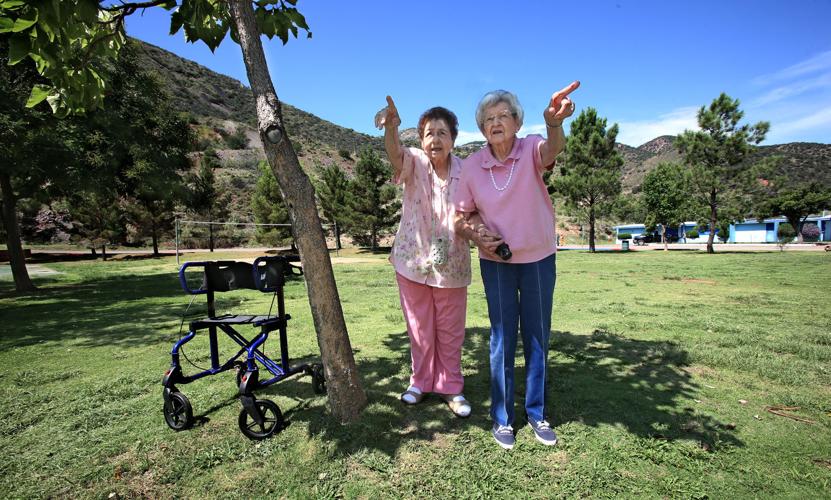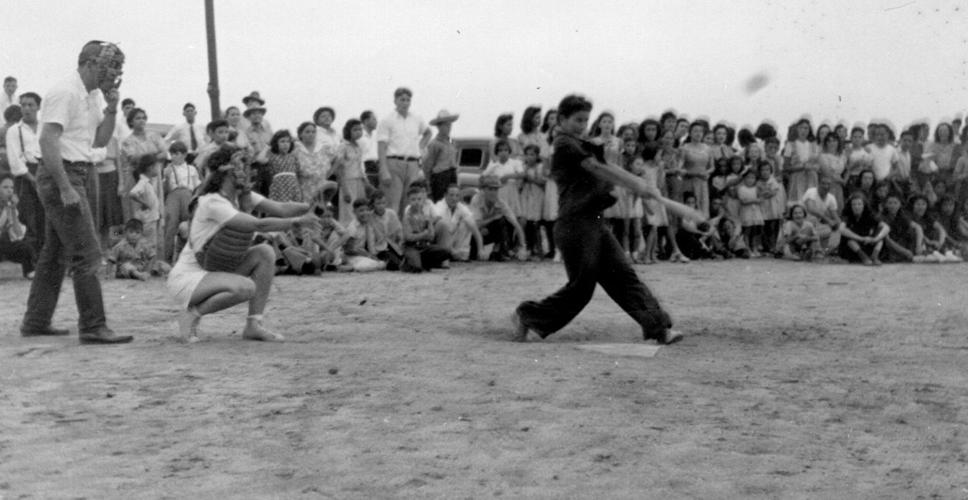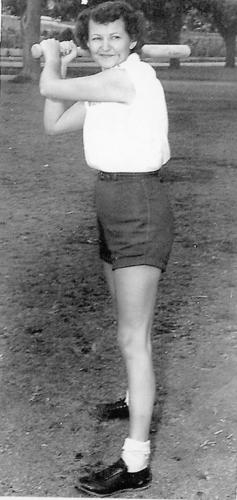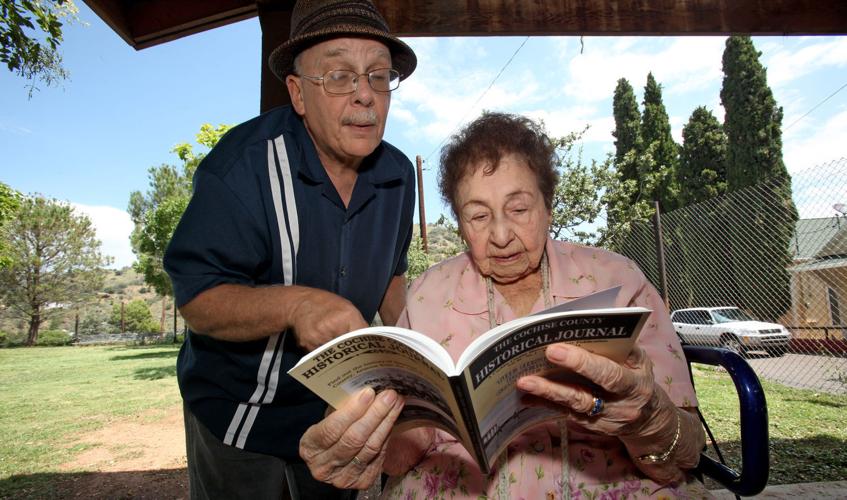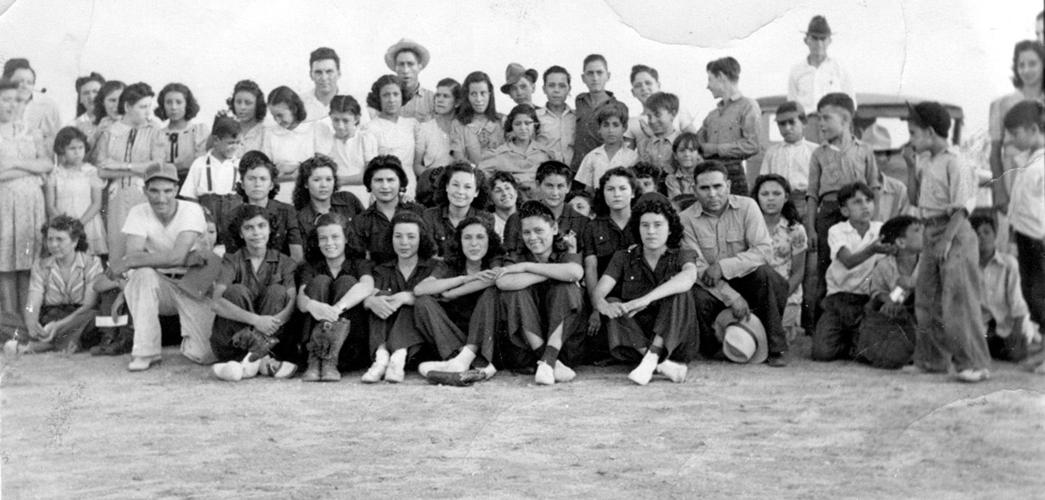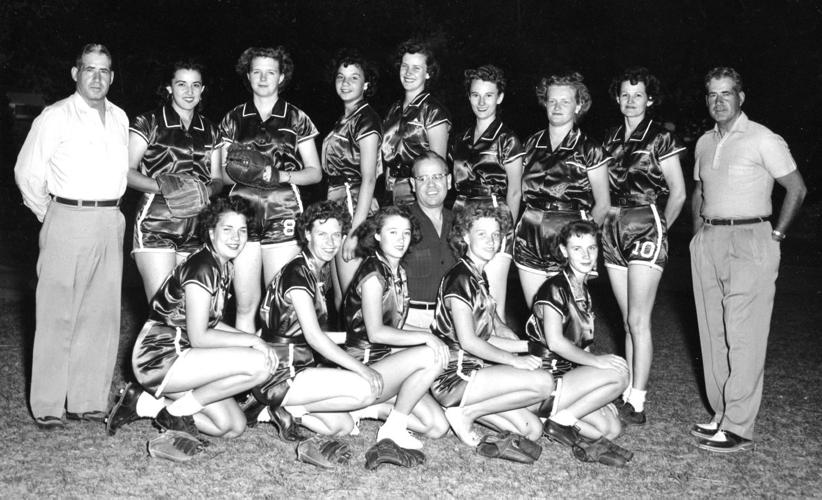BISBEE — The last time Anne Henry and Lupe Jordan saw each other, the United States had yet to enter World War II.
It was the slammin’ summer of 1941. Ted Williams was on his way to batting .406. Joe DiMaggio was carving his way to a 56-game hitting streak.
They met on a softball field in Bisbee, when Bisbee was still a town that warranted a train stop. The Douglas Jitterbugs and Southern Arizona Auto were tied 3-3 in the fifth inning when a summer storm hit. Play never resumed.
Back then the mines were pumping out buckets full of copper, gold and turquoise. But the digging stopped and the population dried up.
The paint on this town has faded. But not the memories.
Anne and Lupe have grayed in the seven decades since they last saw each other. Both have neat, cropped hair and both wear pink. Their steps are measured.
They dream sometimes. And in those dreams they are back on this field, 74 years ago.
They can see it now.
Lupe pushes to rise from her wheelchair, and Anne hurries to lend a hand. She rushes as much as a 93-year-old can.
“How do you say it? I’ve got a flat tire,” Lupe jokes.
They walk, ever so gingerly, to the grassy diamond that used to be their playground, invited back together recently by Bisbee baseball historian Mike Anderson. The decades have not been so kind to what used to be called Horace Mann Field. A tree grows from what was the pitcher’s mound.
“You know, there was a board there, and I always made a little hole where I could put my toe,” Lupe says. “My toe always had to be in that little hole.”
She was 16 then, in the summer of ’41, the kind of girl who won beauty pageants — and boy, did she. They wore short shorts on the field in those days, and Lupita blocked out the catcalls from the bleachers behind first base, which are gone now, replaced by a set of benches.
Only after the game did she learn what they yelled at her — “Piernuda! Piernuda!” — Spanish slang for “nice legs.”
“I guess I must have had good legs,” she says with a little twinkle.
Baseball and softball games were popular diversions back in the day, when Bisbee was in the midst of its first major population bust after the mines cut way back on production. Population dropped from 8,023 in the 1930 census to 5,853 in 1940, a plunge of 27 percent. Once among the biggest mining towns in the West, wartime Bisbee was a place that needed a boost. Fans gathered around 7 p.m. that day to watch the girls play before piling into cars and driving to Warren Ballpark to watch the boys play at 8:30.
“I don’t know how they found out where we were going to play, but the big crowd was there,” says Lupe, who made the trek from Douglas with the Jitterbugs. “We had no bleachers on our side. They sat on the ground, stood up. But they followed us.”
“We had a rooting crowd,” Anne adds. “A very good crowd. Parents, brothers, sisters, relatives were always there to see us. They kind of admired us to think that girls would go out there and play ball.”
It was, Anne said, “the only softball field we had in Bisbee” — and it was so much more to her.
One day a strapping ballplayer named Bob Henry, 6 feet 6 inches of Arizona strong, watched the pretty young Annie Mihelich play a game on this field and became smitten with her.
She says she was a baseball fan — “I liked Lou Gehrig, Ted Williams, Joe DiMaggio” — so it’s no surprise she fell for a ballplayer. Bob eventually played for the Class C Bisbee-Douglas Copper Kings of the Arizona-Texas League until 1951, when he went to work for Phelps Dodge Mining Company, the main employer town.
They would go on to play softball together for years until settling down to raise a family.
Anne had her taste of the big leagues, too. In 1947, after batting .760 in 19 local games, she was signed by the Rockford (Illinois) Peaches of the All-American Girls Professional Baseball League, the team made famous in the 1992 film “A League of Their Own.”
If she thought the crowds were loud in Bisbee …
“I remember going from there to Racine — they were the top team — and I looked around the park and it was full,” she says. “Then when they let out a roar or a cheer, it was loud. I’ve never been around anything quite that loud.”
But life is quieter now — sometimes a bit too quiet for Anne’s liking.
Lupe knows the feeling.
Their stories are so similar it is almost eerie. You wonder, had they lived closer, would they have been great friends? Might they still be?
They both loved sports, both married local sweethearts who were taken away by war only to return, mercifully, intact. They both lost their treasured others and have only the memories.
Anne and Bob met on the ballfield; Lupe and Ramon Jordan met in the schoolhouse. Like Bob with Anne, Ramon first spotted Lupe on a softball field.
It was 1938. Ramon was a senior and Lupe a freshman, and he was struck by her. Piernuda. Nice legs. One day he passed her walking up the staircase at school and he passed her a note. She still has it.
“Love is like wine, not only because it intoxicates the holder, but also the beholder,” it read. “Think it over, kid.”
They were a match, and the flame never went out. They married in 1943, after he’d already enlisted in the Navy, which took him all over the South Pacific during World War II.
Lupe still has the letters he wrote to her while abroad. She also traveled, to Seattle and to San Francisco, where he was stationed. They were in San Francisco on August 15, 1945, when Japan surrendered.
“I can still see the confetti coming down,” she remembers. “I was looking out the window, and I could see it. I told my husband, ‘I’m going to go out and see’ and he wouldn’t let me. He said, ‘If you open your mouth, it’s going to fall in your mouth!’”
A short time later, Ramon sent Lupe back to Douglas with their little girl, whom they would name Virginia Elaine Jordan, the initials – V-E-J – standing for Victory in Europe and Japan.
“Now she says, ‘Mom, why did you name me that?’” Lupe said. “Because I never want to forget that day.”
Anne, like Lupe, was touched by World War II.
She served as an aviation storekeeper first class in the Navy from 1944 to 1946, with a stop at basic training in New York before being stationed in Oakland, California.
Bob, meanwhile, was in the U.S. Army. The two played against each other in Army-Navy exhibitions years later. Even more years later, the Bisbee High School softball fields were named in honor of Anne and fellow Bisbee star Betty Bays, who also played in the All-American Girls League.
Throughout their life together, baseball was the thing for Anne and Bob. It wasn’t just America’s pastime. Their family was the needle, baseball was the thread.
So, too, it was for Ramon and Lupe. They lived a fruitful life together, raising their children, including twins Lon and Don, in Douglas.
Ramon worked for the post office for decades, finally retiring as the postmaster of Pirtleville. They became involved with the community, and Ramon served 20 years on the Douglas City Council.
Ramon died in September 2012 after a battle with Alzheimer’s disease. Before he died, he pulled Lupe close and told her that he’d had money taken from every check to be set aside in case he went first. Now she is taken care of, “and I thank him every day when I get it,” she said.
But that does not fill the emptiness.
“It is very sad, very lonely,” she said. “My husband was such an intelligent guy. He was very, very good at everything. You feel so alone. He was everything. He built the house we lived in.”
She shakes her head, and you can see the sadness set in.
Anne hears and shakes her head, too.
“It is lonely,” she agreed.
Bob Henry died in 1991 after a bout with cancer.
“I try not to think of it too much,” Anne says. “I’m always busy, doing something. I live alone, but I’ve got a big house. Don’t use it all, but try to keep it up. I go out with the gals quite a bit. Breakfast every Sunday morning. I keep myself busy. That helps.”
The common lament from these women is of summer days gone by too fast.
After 1941, Lupe never played seriously again. The next year, the country — her soon-to-be husband included — was at war.
“I wish I had been able to play longer,” she says. “I did play some with the ladies who belonged to the other sailors. But that’s all, just there on the base.”
Looking back, Anne has one regret, too.
“When I went back and played with the Peaches, that was in 1947, and in 1948 I didn’t want to go back east, and I think I made a mistake,” she says. “I should’ve gone back. But I thought, being in the Navy, living out of a suitcase, then playing ball and living out of a suitcase. I want to stay home.”
Baseball — baseball in any form, softball included — gets into you. It sticks. Just talking ball around a park, particularly one that was home to so many memories, can stir up the soul.
“I have a ball at home and I pick it up and I feel it,” Lupe says. “I remember they would say if you get the ball and hold it just this way, it’ll help you more.”
“When I grabbed the ball, I always wanted to put my fingers on the thread,” Anne says. “I would turn the ball until I felt that thread.”
“Yes!” Lupe agrees. “Turn it and turn it and turn it. You have to, until it feels good in your hand, and then you could go like this.” She flicks her wrist.
“I didn’t do that,” Anne says. “I threw it straight and as hard as I could.”
The women are getting tired. It is time to leave. Appointments to keep.
“It’s nice to see someone from Douglas,” Anne says. “We played Douglas quite often. I got to see her playing, thinking I would never see her again, and here we are.”
Yes, here we are, 74 years later.
You think it’s the first time they’ve seen each other in seven decades.
But it’s not.
“Sometimes I dream that I’m playing,” Lupe says. “I’m very active, I’m playing, I’m running. And then I wake up.”


